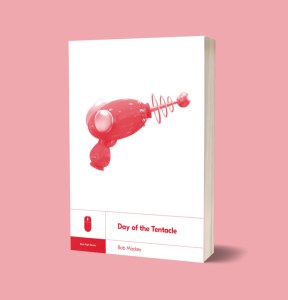As Boss Fight books go, Day of the Tentacle is unusual in that it is not, strictly speaking, an original composition about the 1993 LucasArts adventure game. Author Bob Mackey is a video game journalist who worked for USgamer.net among other publications, and thanks to this experience, was able to interview the production team behind Day of the Tentacle on multiple occasions. USgamer.net, incidentally, doesn’t actually exist anymore. Its content is archived on VG247, including Mackey’s relevant interviews, but the highly dispersed nature of all the work he’s done documenting Day of the Tentacle over the years doesn’t exactly make this work easy to reference. Consequently, the Boss Fight edition of Day of the Tentacle conveniently locates all of this work in a single print source, for anybody so interested in the history behind LucasArts’ last major 2D adventure game.
As to why anyone should be so interested…well…pretty much for that reason. Overshadowed by its prequel Maniac Mansion in the annals of 2D adventure game history, Day of the Tentacle is the culmination of everything that Dave Grossman, Tim Schafer, and pretty much everybody else at LucasArts learned about making such games before the march of progress made it so that 3D adventure games were all anyone wanted to produce. Bear in mind, of course, that the preference for 3D games wasn’t entirely arbitrary. The widespread adoption of compact discs for PC games didn’t just make 3D practical, it also made it possible for games to include extended vocal tracks. Fans of arcane thirty-year-old technology will chuckle to themselves during anecdotes about how Day of the Tentacle had to be squeezed onto six floppy disks because that was as many floppy disks that could be used without being overly expensive. Then the German version was just barely big enough that it needed seven.
The story of Day of the Tentacle isn’t just offbeat and bizarre from the way it was produced, of course. The genuinely weird game made the most of its time travel mechanics, with three heroes in the past, present, and future of Maniac Mansion working together to prevent the titular tentacular antagonist from conquering the world. Equally as horrifying as the sci-fi future, however, is the American Revolution era past. In order to fiddle around with the timeline properly, the player must manipulate the often-buffoonish Founding Fathers into writing all sorts of goofy laws into the Constitution.
At times, classic PC adventure game logic was famous for its absurdity. But the designers of Day of the Tentacle insisted that they’d come a long way since the Sierra days and had developed a decent rhythm to keep players from getting stuck. In one story, they note how early builds of the game immediately gave the player control of characters in all three eras. This was a bad idea- with too much they could do, the player had no real idea what they should do. For the player who has yet to try Day of the Tentacle, the Boss Fight book also details the most arcane progression traps- a technical pratfall of switching one bed with another bed, and having to start a rainstorm by washing a carriage.
Neither of these sound all that bad, at least in the interview context, to the point I’m tempted to play Day of the Tentacle someday, maybe, despite my generally being terrible at those sorts of puzzles. In general, Day of the Tentacle is a remarkably effective advertisement. The remaster of the game, as is claimed by the book’s interviews, was actually a fairly in-depth effort made by fans of the game with its original files as carefully preserved by the Day of the Tentacle team way back in the nineties. In an absurdity completely on brand with everything else in or about the game, the remaster has actually sold more copies in the modern era than it ever did on floppies, for which there were no doubt many illegal copies.
The post A review of Day of the Tentacle from Boss Fight Books appeared first on Old School Gamer Magazine.










